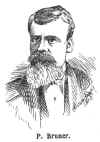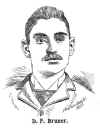Since the biography of Emanuel Fisher and family has been in type, Bruce, his second son, died of neuralgia of the stomach.
This occurred at his home in Rock Branch township, January 23, his remains were interred in the Norton cemetery Jan. 24, 1894.
Fisher moved from Pennsylvania to Iowa in 1866 and lived in Lynn county until they moved to
Kansas in 1873.
Fisher enlisted in company D, 138 Pennsylvania Infantry in August 1862 as a private, and served until the close of the war.
He was in all the battles in the Shenandoah valley and Wilderness campaigns and when mustered out was a first lieutenant.
He has never been a candidate for any public office but has frequently represented his township in county conventions.
He has always been a republican and a strict church member; he was raised in the German Reform church but when the Presbyterian church was organized at Calvert he united with them and has ever since been of of the elders.
 Philip Bruner was born at Carroll, Fairfield county, Ohio, August 15, 1843; moved with his parents to Lynn county, Iowa in 1850, was reared on a farm and received a common school education; married Miss Margaret E. Newell March 21, 1867.
Six children were born to them, John born January 7, 1869, died October 25, 1881; David Franklin born July 12, 1870; Margaret Ann born December 29, 1872, died June 26, 1879; Jesse Raymond born August 6,
1889, died January 24, 1884; Mary Ellen born November 11, 1886; the three children that have died are buried in the Norton cemetery.
Philip Bruner was born at Carroll, Fairfield county, Ohio, August 15, 1843; moved with his parents to Lynn county, Iowa in 1850, was reared on a farm and received a common school education; married Miss Margaret E. Newell March 21, 1867.
Six children were born to them, John born January 7, 1869, died October 25, 1881; David Franklin born July 12, 1870; Margaret Ann born December 29, 1872, died June 26, 1879; Jesse Raymond born August 6,
1889, died January 24, 1884; Mary Ellen born November 11, 1886; the three children that have died are buried in the Norton cemetery.
When Bruner came to Norton in 1873 he settled on a farm two and a half miles from Norton.
In the winter of 1875 he and David Close built a store building on the corner where the Bruner block now stands, and in February 1876 they put in a stock of general merchandise under the firm name of Close & Bruner.
In 1889 he purchased Mr. Close's interest in the business which he continued in his own name until the great fire of 1886.
He had build up a large and lucrative trade and had one of the finest equipped stores in Norton, consisting of ten thousand dollars' worth of merchandise; he saved less than two hundred dollars worth of goods at the time of the fire, and received three thousand dollars
insurance.
Shortly afterward he opened up a stock of dry goods in a small frame building which was located temporarily in the street at the north west corner of the public square.
Late in the fall of 1886 he sold his goods to Hugh Kirkpatrick and on account of failing health retired from business.
In the spring and summer of 1886 he build the magnificent Bruner Block which stands here today as a monument to his
thrift and enterprise. He had the unanimous endorsement of the business men of Norton to succeed William H. Hiles as postmaster in 1885 but declined the honor and W. R. Cannon was appointed.
Although not a bitter partisan he always voted the Democratic ticket. He was brought up in the German Reform church but became a Presbyterian after coming to Norton.
He died May 24, 1887 and is buried in the Norton cemetery.
 His eldest son, David Franklin purchased the John Hole boot and shoe stock Jan. 1, 1891 and has since conducted the only exclusive boot and shoe store in Norton.
He is a graduate of Hastings Business college; he has inherited many of the good traits of his father and is fast developing into a leading business man; he married Miss Lillie Waller May 2, 1893, to who was born a son Jan. 11, 1893.
He takes an active part in all church and charitable work, his politics are Democratic.
He and Arthur Saum in May 1892 opened up a
His eldest son, David Franklin purchased the John Hole boot and shoe stock Jan. 1, 1891 and has since conducted the only exclusive boot and shoe store in Norton.
He is a graduate of Hastings Business college; he has inherited many of the good traits of his father and is fast developing into a leading business man; he married Miss Lillie Waller May 2, 1893, to who was born a son Jan. 11, 1893.
He takes an active part in all church and charitable work, his politics are Democratic.
He and Arthur Saum in May 1892 opened up a
|